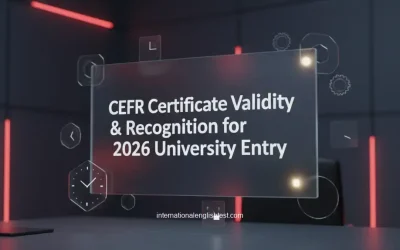In today’s globalized world, English proficiency is essential for academic, professional, and personal growth. Whether you’re aiming to study abroad, seeking a job in an English-speaking environment, or preparing for an immigration process, proving your English proficiency is a crucial step. The ability to showcase your language skills with a credible certification can open doors to various opportunities.
In this article, we’ll discuss how you can prove your English proficiency, the different methods available, and how tests like the International English Test (IET) can help you achieve your goals.
1. Take an Official English Proficiency Test
One of the most reliable ways to prove your English proficiency is by taking an internationally recognized English test. These tests are designed to assess your reading, writing, listening, and speaking skills in English, and the results can be used to demonstrate your level to employers, educational institutions, and immigration authorities.
Popular English Proficiency Tests
- International English Test: A more affordable and accessible option, accepted by many institutions for admissions and visa purposes.
- IELTS (International English Language Testing System): Widely accepted for study and work visa applications in English-speaking countries like the UK, Canada, and Australia.
- TOEFL (Test of English as a Foreign Language): Primarily accepted in the United States for university admissions, as well as in other countries.
- PTE (Pearson Test of English): Recognized by universities, colleges, and governments worldwide, including for visa applications.
- Cambridge English Exams: Includes certifications like the FCE, CAE, and CPE, recognized globally in both academic and professional settings.
Each of these exams has different formats, but all are designed to give a comprehensive evaluation of your language proficiency. Choosing the right test depends on your goals, whether it’s for academic purposes, professional development, or immigration.
2. Use an Online English Test
For those looking for a quick and accessible way to assess their English proficiency, online English tests can provide a fast, convenient solution. While not as widely recognized as the major standardized exams, these tests can offer a rough estimate of your language level and help you identify areas of improvement.
Online tests such as EF SET and Oxford Online English Tests provide free, quick assessments of your English skills based on the CEFR (Common European Framework of Reference for Languages) levels. These assessments can help you determine whether you’re at an A1, B2, C1, or other levels and guide you in your preparation for a more formal exam.
How Online Tests Help
- Quick Results: You can get immediate feedback on your strengths and weaknesses.
- Convenience: These tests can be taken from anywhere with an internet connection.
- Cost-Effective: Many online tests are free or low-cost, offering a great starting point for your language journey.
However, for formal purposes like university admissions or job applications, it’s advisable to rely on an official certification from recognized testing agencies.
3. Showcase Your English Skills Through Certifications
If you’ve completed a language course, you may have obtained a certificate from the institution or school that can prove your English proficiency. For example:
- Language Schools and Universities: If you have completed an English course or degree at a recognized institution, the certificate you receive can serve as proof of your language ability.
- Online Courses: Online platforms like Coursera, EdX, and Udemy offer courses in English and often provide certificates upon completion. While these may not be as widely accepted as formal language exams, they can still be useful for demonstrating a commitment to improving your language skills.
If you’re preparing for the International English Test (IET), completing relevant courses and earning certificates can significantly boost your confidence and help you perform better on the actual test.
4. Provide Work Experience or Volunteering in English-Speaking Environments
Another way to prove your English proficiency is through real-world experience. If you’ve worked or volunteered in an English-speaking environment, you can showcase this experience to demonstrate your ability to use English in practical situations. This is especially useful for job applications and visa purposes.
For example:
- Job Experience: If you’ve worked in a position where English was the primary language of communication, your employer can provide a reference letter to support your proficiency.
- Volunteer Work: If you’ve volunteered with organizations where English was used for communication, including a reference or testimonial can validate your language skills.
This kind of experience is particularly valuable in a professional context, as it shows that you can navigate complex work environments using English.
5. Use Your Academic Qualifications
If you have completed your education in English, whether in an English-speaking country or at an international school, your academic qualifications can serve as evidence of your English proficiency.
Examples of Academic Qualifications:
- High School Diploma: If you completed high school in an English-medium school, you can provide this as proof of your language ability.
- Bachelor’s or Master’s Degree: For higher education, if your degree was taught in English, it can be used as proof of your proficiency.
- International English Programs: Programs like the International Baccalaureate (IB), which are often taught in English, can also serve as evidence of your proficiency.
6. Request a Language Proficiency Letter from Your School or Employer
If you’re unable to take a formal test or present a recognized certificate, you can request a language proficiency letter from your educational institution or employer. This letter should confirm that you have sufficient command of English to work or study in an English-speaking environment.
For students, the letter may come from your school’s language department, while for professionals, your employer may provide the letter based on your day-to-day responsibilities and language use.
7. Prove Your English Through Personal Projects or Portfolios
Another innovative way to demonstrate your English proficiency is by creating a personal project or portfolio that showcases your language skills. This could include:
- Blogging in English: If you have a personal blog or website where you write in English, it can serve as evidence of your writing skills.
- Social Media Presence: Active participation in English on platforms like LinkedIn or Twitter can also indicate your proficiency.
- Creative Projects: Videos, presentations, or other creative work in English can highlight your ability to communicate effectively.
This method is particularly useful if you’re seeking to prove your proficiency for personal reasons or in the creative industry.
Conclusion
There are multiple ways to prove your English proficiency depending on your needs, goals, and the context in which you need to demonstrate your skills. Whether through official tests like IELTS, TOEFL, or the International English Test (IET), an online language test, academic qualifications, or work experience, having evidence of your English abilities will help you achieve your personal, academic, or professional goals.
Remember, it’s not just about passing a test; it’s about showcasing your ability to understand and communicate in English. Take the steps today to prove your proficiency and open doors to exciting opportunities worldwide.
Keywords: prove English proficiency, International English Test, IELTS, TOEFL, English proficiency certificates, language test, English for study abroad, English for employment.




